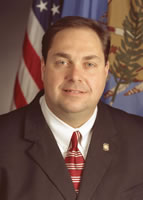Cord Blood Bank Advances Despite House Republicans’ Stonewalling
 Senator Jay Paul Gumm
Senator Jay Paul Gumm
House leaders killed a proposal to create a public umbilical cord blood bank only to reluctantly resurrect the language in a second bill.
Senator Jay Paul Gumm and Rep. Rebecca Hamilton introduced Senate Bill 139. The measure would have created the Oklahoma Public Cord Blood Bank at the University of Oklahoma Health Sciences Center.
House Republican leaders refused to give the bill a hearing. Instead, House Republicans dropped almost identical language creating a public cord blood bank into a second bill that is sponsored by Republican lawmakers.
“We are grateful House leaders – after more quite a bit of stonewalling – either ‘saw the light’ or ‘felt the heat’ and finally decided saving lives was worthy of consideration by the full House,” said Gumm, a Democrat from Durant.
“Still, it is curious they couldn’t simply move the original bill, which was ready to go. It begs the question, ‘Are House Republicans so bereft of ideas that they have to steal them?’ I guess Harry Truman was right: ‘It is amazing what you can accomplish if you don’t care who gets the credit.’”
Under both the original bill and the amendment approved by the House Wednesday, the cord blood bank would be a repository of umbilical cord blood donated by families following the birth of healthy children. Cord blood is rich in adult stem cells, which can be used to treat a variety of blood diseases, including leukemia, as well as various immune and metabolic disorders.
“Regardless of which measure passes, a public bank would give every Oklahoma family a chance to store their umbilical cord blood with lifesaving results,” said Hamilton, D-Oklahoma City. “Every family, not just the wealthiest among us, deserves access cord blood banking.”
Private cord blood banks are available now, but the cost associated with testing, processing and storing cord blood cells is out of the reach of most Oklahoma families. “We’ve all seen commercials for private cord blood banks that never mention the cost,” Gumm said. “It’s almost like the old saying, ‘If you have to ask the price, you can’t afford it’.”
Another problem with private banks, the lawmakers added, is that they cater to those who pay the bill: family members genetically related to the infant whose cord blood is collected. The benefit is narrowly directed, and the cells in the blood are not part of national bone marrow and cord blood registries.
The measure is destined for a conference committee for final revisions. Once approved there, the bill will return to both the Senate and House for final votes; if it passes muster, it would be referred to the governor.
 Oklahoma Senate
Oklahoma Senate

